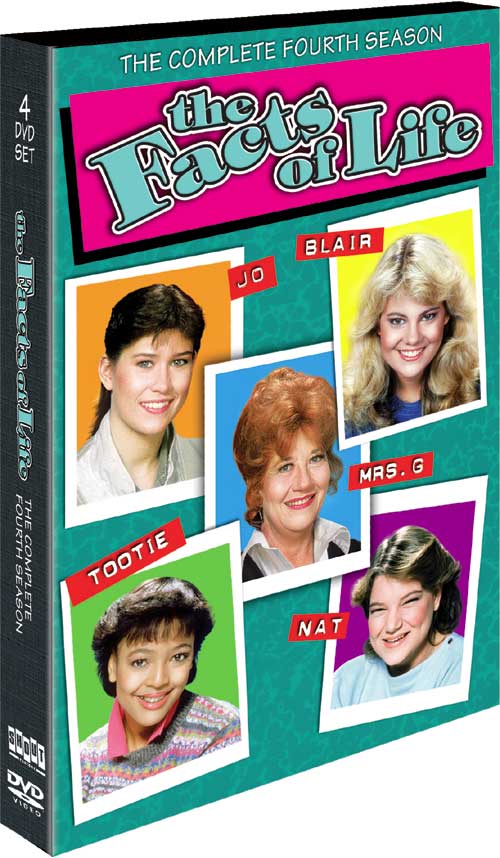Things I Learned From Watching Season 4 of THE FACTS OF LIFE
Last week Shout! Factory brought out The Facts of Life season 4 (Sony, the show’s owner, brought out the first three seasons a few years ago). This was the first time in several years I’d watched the show, and these are the things — one might even say facts — I learned:
Share
 Last week Shout! Factory brought out The Facts of Life season 4 (Sony, the show’s owner, brought out the first three seasons a few years ago). This was the first time in several years I’d watched the show, and these are the things — one might even say facts — I learned:
Last week Shout! Factory brought out The Facts of Life season 4 (Sony, the show’s owner, brought out the first three seasons a few years ago). This was the first time in several years I’d watched the show, and these are the things — one might even say facts — I learned:
1. I seem to recall the second and third seasons being better-written than this one, even though they had the same writing staff. Maybe I’m remembering too fondly, or maybe they were running out of story ideas.
2. As a kid watching the show in syndication, I didn’t much like Mrs. Garrett, finding that all she ever seemed to do was preach, rather than say or do anything funny. I am pleased to say I haven’t changed my mind about that. Charlotte Rae, I like (for Pete’s sake, she was the original Mammy Yokum in the Broadway production of Li’l Abner). But if they ever remake The Facts of Life, they might consider letting the four girls solve their own moral dilemmas.
3. I actually had no idea, as a kid, that “I just had another one of my brilliant ideas” was supposed to be Blair’s catchphrase. But it was. She says it once in the TV movie The Facts of Life Goes To Paris and again in another episode.
4. The ending version of the theme song with the different lyrics (“You’ll avoid a lot of damage”) is better than the main title version.
5. Even watching a middling sitcom like this one, I’m impressed by how much riskier sitcoms could be in their storytelling choices than they can today. There was still, for example, the option to let an episode end sadly, with problems unresolved or even worse than when the episode started. The rule now, pretty much, is that every mainstream sitcom episode has to end on an “up” note unless the producer is Larry David. But one episode I watched was about Blair discovering that her dad has been using her for tax write-offs all these years (he doesn’t go to jail, because as the episode accurately points out, rich people don’t go to jail for stuff like that) and not only does the episode end without a hug, the freeze-frame comes on her realizing that her father doesn’t really care about her at all. Not a great episode, not a great show, but it comes from a time when sitcoms felt free to get away with a wider range of tones, styles, and emotions than they do today.
6. That episode I just mentioned? One of many episodes written or co-written by Paul Haggis. He wrote a lot better back then than he does now, much as Alan Ball has never lived up to the promise of Oh, Grow Up.
7. The bad side of how sitcoms could get away with things they can’t today: another episode I watched (which I had not watched as a kid, or I didn’t remember if I did) had Blair meeting a mentally-challenged boy whose disability she doesn’t notice at first, and the first ten minutes were the most tasteless parade of “retarded” jokes I have ever seen. Seriously. It’s Always Sunny In Philadelphia could never have that much bad taste. Nor should it, because those jokes aren’t funny.
8. Continuing on the “bad side” line: I miss the fact that multi-camera sitcoms once felt free to do dramatic scenes (the theatre-style shooting is actually very well suited to this kind of scene, maybe more so than single-camera sometimes), but watching these episodes reminds you of part of the reason why the “very special” episode died out: this kind of scene can cruelly expose the weakness of an actor who can just sort of get by in a comedy scene. Those of us who grew up with Facts of Life may remember that Kim Fields (Tootie) was okay with a wisecrack but went off the rails when she had to do anything serious, particularly when she had to yell. It is much harder to disguise an actor’s weaknesses in multi-camera than in single-camera, where a scene can be done in bits and pieces and then fixed in the editing.
9. Finally, I had forgotten that Blair was an atheist who, in one episode, gets punched by Jo for denying that there is a God. Knowing that Lisa Whelchel is almost but not quite on a Kirk Cameron level of born-again-ism, that comes off very strangely today. I have no idea if the writers meant it as an in-joke.